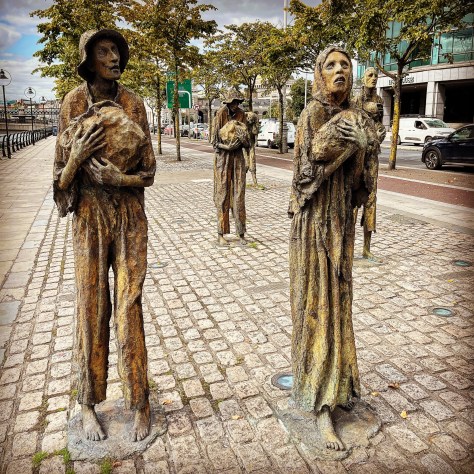
Well the week ended with a red weather warning, our offices were closed, I worked from home and my afternoon online meeting was cancelled because of the weather.
I spent most of the week in London. The last time I was in London was at the end of November.

This was also my first opportunity to take advantage of 5G (new phone and all that). What they don’t tell you with 5G is how slow the upload speeds can be. Fine for streaming. Rubbish for online video conferencing.

I had planned to attend WonkHE’s Making Sense of HE event on Monday, but the end result was I wasn’t booked onto the event, so I headed into the office in London. Our office was relatively quiet and so I did managed to get lots done, but missed the social aspect of the office.
On Tuesday I did attend WonkHE’s The Secret Life of Students. This was a real in-person event in central London. I have not done one of those for a while. I think my last in-person (external) event was Digifest back in 2020.

The opening session was on diversity the key takeaways from the event for me were that diversity needs to be done differently than what we have been doing before. We need to think more about the individual rather than just fixing issues for identified “groups”. It was apparent that there was a need in the sector to think about transforming their approach to diversity. I was reminded of how there have been changed approaches to accessibility and digital in the higher education sector. There is now much more consensus about a whole organisational approach to challenges, and thinking about a more personalised approach to accessibility for example.
There was lots of commentary about unusefulness and lack of evidence for generational stereotypes, therefore we should avoid using terms such as Generation Z or Millenials.
The Pearson report on belonging was interesting and could be relevant to universities as they attempt to rebuild their communities following the pandemic restrictions.

The afternoon sessions focussed on the main on student outcomes. Lots of references to Student Futures report. There were a fair few sessions on digital as well. There are opportunities and concerns about digital.

As you might expect from an event where the audience was very much seated in student support (and SU) the focus of discussion was very much on how universities could and should support wellbeing and mental health. A fair amount of concern expressed about using data and digital to do this, the human factor was seen as critical.

Again feedback about having a shared understanding of key terms such as personalisation, hybrid, etc… This wasn’t so much about having a national discussion on the definitions, but ensuring locally everyone understands what the university is trying to do in terms of hybrid, personalisation, blended learning, etc… The fact that they started referencing multi-modal teaching as an alternative to hybrid, shows again the sector likes to spend time discussing definitions rather than solutions.
There was some discussion about the WonkHE Kortext report which I blogged in last week’s Weeknote.
Institutional technical debt came up in presentations (from people like Mary Curnock Cook) however the audience were not engaged with it so much (probably as they are not directly involved in this. Though we saw it is an issue with many (see Twitter thread) outside the event. There are data and technology legacies out there that are stifling progress, but universities struggle to know how to get out of technical debt.
I found the session on supporting students and enabling them to cope with university interesting. Assumptions are made about their “readiness” obviously links here with digital capabilities and skills.
Overall, I really enjoyed the event, it was nice to experience the eventedness of an in-person event. Something I have found missing from online events. I think part of the reason is that most online events I have attended during the pandemic have been poor translations of physical in-person events Losing all the nuances of what makes those events so engaging and not taking advantage of the affordances that digital platforms can provide. Though the coffee was awful.

Wednesday I was in the London office again, there were a lot more people in on that day, which made it much more social. It was really nice to catch up with colleagues, who I wouldn’t generally interact with much as part of my role. I spoke to one of our service directorates in the afternoon about the HE strategy and what it means for them.
Thursday I had a meeting with the Office for Students as part of their funding of Jisc. I updated them on some of the work we have been undertaking in the teaching and learning space.

Glad to return home on Thursday as there was travel chaos on Friday because of storm Eunice.
I spent part of the week working on how we can improve and enhance our thought leadership offer. I actually don’t like the term thought leadership, so rarely use it externally (there is an exception here for example), however it is a term I use internally (as it is in our core strategy). It should be noted that many in the HE sector actually don’t like the term thought leadership. However if you ask people from the sector about the actual content that is produced that we would think of as thought leadership, then there is a different story as they find this useful, inspiring and helps them think. Similarly, members will often ask for specific people within Jisc who are experts in their field for help and support. Or they will find presentations and articles from individuals inspiring. This is something we need to work on further.
I also did a fair bit reflecting on the Student Futures Manifesto. One of their recommendations is for a new national technology infrastructure strategy.
We recommend that Jisc build upon their leadership work first to review the existing technology estate in HE, and then, as a matter of urgency, produce further guidance to help universities more rapidly modernise their systems architecture and applications. While many universities already have ‘digital transformation’ plans underway, further guidance to universities about the basic architectural building blocks and data systems to support a digital university, and how to plan and execute a transformation, would be welcomed.
The recommendation continues
The centrality of technology now means there is a case for this sector leading approach, because this remains a core strategic capability which leadership teams struggle with.
Heidi Fraser-Krauss, Jisc CEO, said: “I wholeheartedly support today’s report by the UPP Foundation, which goes a long way to address the pandemic-related concerns and needs of students. I also welcome the Student Manifesto to help students rebuild their confidence, regain control of their studies and plan for a successful future after graduation. “The report is right to recommend action on tackling digital and data inequities. Jisc’s digital experience insights surveys of university students and academic staff showed the detrimental effect on teaching and learning experiences from not having access to reliable connectivity, technology and digital skills. “I will be keen to action any Jisc-related recommendations to help support universities in modernising digital infrastructure as well as digitally transform learning, teaching and assessment to improve the experiences staff and students seek. As we move towards established models of hybrid learning, we have an opportunity to transform education through technology. Never have digital, data and technology been so important in meeting the multiple challenges and opportunities that UK universities face.”
My top tweet this week was this one.





































